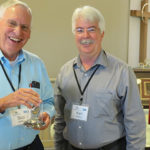FORT WORTH—Including mentally challenged children and adults in church ministry presents unique difficulties and opportunities, but Christians have a responsibility to reach “the most neglected group of Texans,” conference leaders told participants at a workshop during the Baptist General Convention of Texas annual meeting.
“The church needs to learn how to be accepting of them, just as God is accepting of us,” said workshop leader Diane Lane, BGCT preschool/children’s ministry specialist. Lane led the workshop in partnership with James Aldridge, pastor of New Horizon Baptist Church in Lubbock.
Lane addressed difficult questions many fear to voice.
|
Diane Lane, BGCT preschool/children’s ministry specialist, leads a workshop on ministry to mentally challenged people. Lane led the workshop in partnership with James Aldridge, pastor of New Horizon Baptist Church in Lubbock. (BGCT PHOTO)
|
“How do we respond when mentally challenged adults act out in worship?” Lane asked.
Education about the different levels of functionality among the mentally challenged can help Christians understand how to respond.
Aldridge, the father of two mentally challenged daughters, explained how physical appearance often affects people’s perception of mental capability.
“Physical appearance causes people to have different expectations,” he said. It’s frustrating for many people to interact with someone who looks like a mature adult, but who functions on a 6-year-old level, Aldridge continued.
Having people willing to commit to consistent service in ministry to the mentally challenged is critical to a program’s success, Lane said. In a Sunday school class, for example, two adult teachers must always be present. Some ministries have a rotating schedule of volunteers to ensure two teachers for every Sunday, even if it’s not the same people each week, Lane explained.
The first step in beginning ministry to the mentally challenged is to involve the pastor, Lane emphasized. Secondly, people interested in becoming involved must be aware of the discomfort and constant demands that come with this specific ministry.
Sign up for our weekly edition and get all our headlines in your inbox on Thursdays
Most importantly, people must be committed long-term and recognize that ministering to the mentally challenged also includes ministering to their families.
“You have to have committed people who are willing to give. An hour on Sunday isn’t long enough. You have to touch and heal families,” Lane said.
“Many times, families are forgotten.”
Aldridge offered some practical suggestions for ministering to families with mentally challenged children.
“Sometimes, the best ministry to parents is to provide Sunday school for their children, and let the parents stay at home and read the paper,” Aldridge said.
Volunteers also can offer parents time to come and sit with their child. “Be proactive,” Aldridge encouraged.
“In order for us to be Great Commission churches, we need to reach all the population,” he said. “And that includes these people.”














We seek to connect God’s story and God’s people around the world. To learn more about God’s story, click here.
Send comments and feedback to Eric Black, our editor. For comments to be published, please specify “letter to the editor.” Maximum length for publication is 300 words.